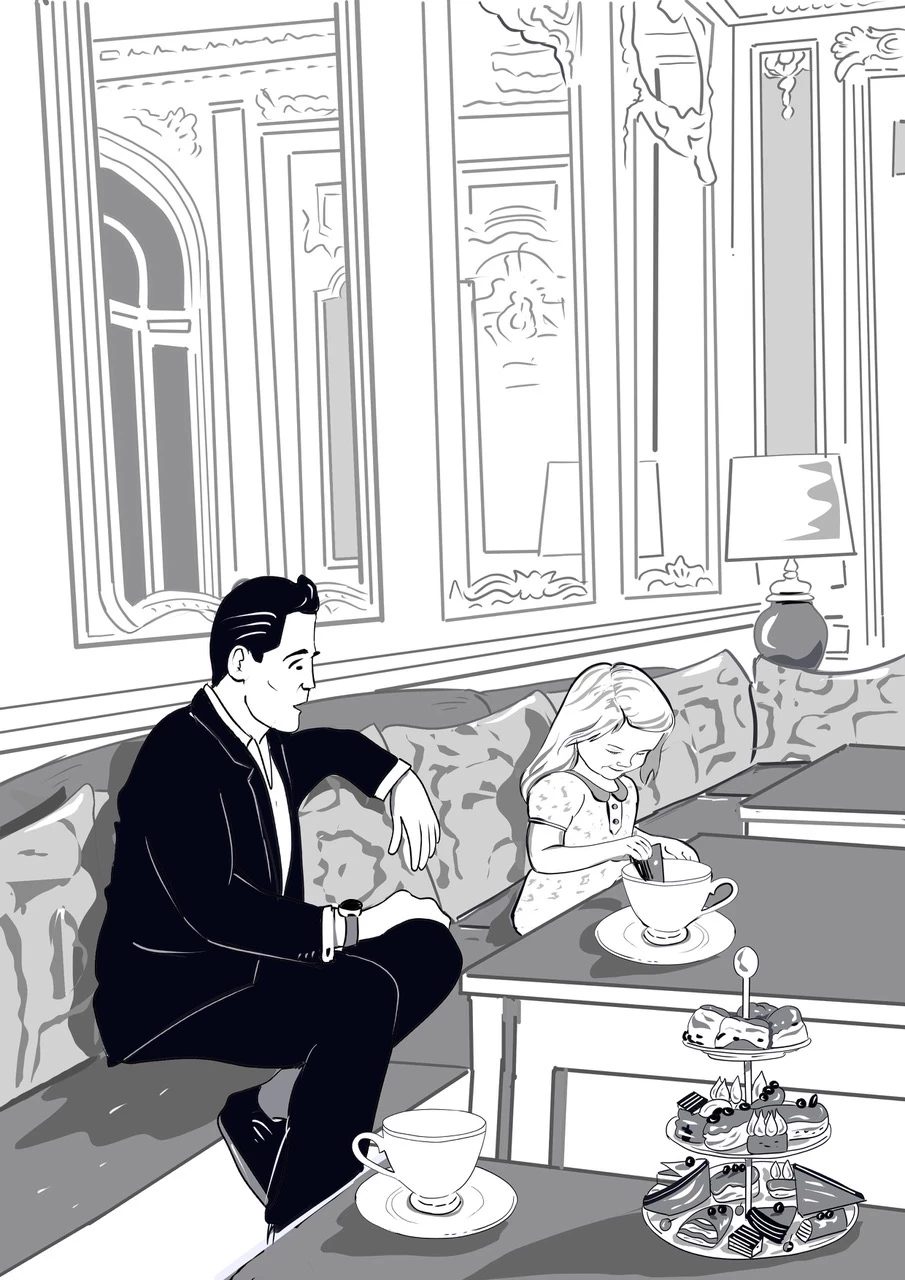Tea With Proust
Chronicles Of Love And Other Human Conditions.

I AM SITTING WITH MY DAUGHTER on our usual sofa at the Hôtel Hermitage when I see an older man looking at us, insistently.
We have been coming here since she was three years old, just the two of us. We call it “afternoon tea at our place,” although not once have we had tea.
We drink hot chocolate with whipped cream and pralines—two servings of pralines because one is simply not enough. She always asks for a madeleine because once I told her about Proust’s madeleine and tea. But we never had tea, just the madeleine.
Everyone knows us here: the doormen who pulled her out from the rotating door more than once because she plays in it, the staff that rush to clean up every time we make a mess, the waitress who religiously asks if she wants whipped cream on her hot chocolate. Time stands still.
We always sit here on this sofa, although they replaced it some years ago. Maybe we left too many stains on the old one. We both prefer the old one.
It is our afternoon tea at our place. She tells me everything, and I listen. Then I tell her everything, and she listens. We create a world of words all around us and we dance together without ever leaving our seat.
The older man sitting a few tables away continues to observe us. He has long white hair and is dressed flamboyantly. I recognize him; he is a fellow Monaco resident. We gravitate in the same circles, although we are yet to be introduced. He smiles and waves. I politely approach him. As I get closer, I discover profound melancholy in his eyes.
“I used to do the same with my daughter,” he says with a European accent. “We would come here together, just the two of us. We used to sit over there.” His eyes twinkle, and for a second, he is thrown back forty years to his past, to his life then with his young daughter.
“Was it worth it? Was it worth starting such a ritual with your daughter?” I gently ask. He smiles, and with eyes filled with joy, he nods.
“Where is she now?” I ask. “She lives in London. She has her family there. She is a mother, you know?” He looks away, and his life flashes in front of his eyes until they turn back to be profoundly melancholic.
“Do you still come here together with your daughter?” I ask.
He reflects for some moments. “We will most certainly come here on her next visit.”
I walk back to our sofa, carrying with me a sense of nostalgia, only for it to be washed away by my daughter’s loving gaze. I then realize the true value of the present. It is a place where neither the past nor the future exist by definition. Yet past memories influence current behaviors that shape expectations. Diabolic.
The eternal present. A prison if you are sad, but absolute magic if you are still in love.
These and other thoughts accompany me through the evening until I decide to take a walk. It is wintertime, and Monaco is delightfully quiet. The nuances of the Principality come alive at this time; every emotion echoes like stiletto heels on marble.
I see a friend. She wears a long red dress, high heels, and a proud gaze. She walks next to me for a while along Boulevard du Larvotto. Lost in my thoughts, I notice she is also lost in hers.
“Beautiful places can be merciless,” she says. “It’s because they are beautiful and you are supposed to be happy. But if you are not happy, all this beauty—the sea, the stars, everything—hurts you.”
She pauses, then continues, “If you feel sad in a sad place, the sadness around you somehow comforts you.”
I hand her my handkerchief. She attempts to smile.
“Are you sad?” I ask.
“No, I am still in love.”
The views and opinions expressed herein are the views and opinions of the author and do not necessarily reflect those of The Monegasque™.
Disclosure: The Monegasque™ enhances the editing process with the help of carefully selected AI tools. These tools provide valuable support without taking over the editing process completely, ensuring that the final product is the result of human creativity and expertise augmented by the benefits of enhanced technology. This article is protected under the copyright of The Monegasque™. Unauthorized reprinting, republishing, or rewriting of this content is strictly prohibited without explicit permission from The Monegasque™. Quotations from this material are permissible provided that a direct link to the full article on The Monegasque™ is included.